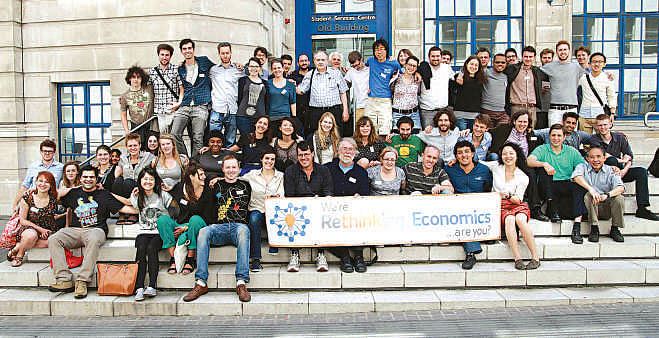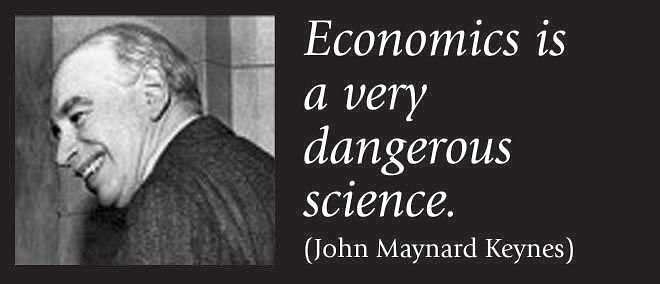Economics is Dead. Long Live Economics!
Economics is Dead. Long Live Economics!

In June 2000, economics students of Panthéon-Sorbonn in Paris revolted. Their 'Post Autistic' petition: economics texts focus on mainstream economics (the neoclassical school) only. Other schools are sidelined. History of ideas in economics had become extinct. In June 2001, PhD students of economics at Cambridge added one new dimension: leading professional journals have sidelined research outside the mainstream. In August 2001, economics students from 17 countries gathered in Kansas, USA adding another dimension to the debate: economics needs re-thinking.
In March 2003, economics students at Harvard joined, but with conservatism: the curriculum needs to include the mainstream, and also challenge students to question gaps within the mainstream. These wake up calls gathered further momentum after the 2008 crash. Economics students at Manchester launched the Post-Crash Economics Society; and those at LSE launched Rethinking Economics. The slogan: The world has changed. The syllabus hasn't. Ha Joon Chang of Cambridge, Nobel laureates Paul Krugman (2008), and Robert Shiller (2013) have raised their voices. So, what's the fuss all about?

Mainstream economics is founded on the neoclassical school. This school originated during the middle of the nineteenth century. Engineering, mathematics and logicians laid the foundations of economics becoming a science that can be modelled and mathematically presented like the physical sciences. The leading exponents were Vilfredo Pareto and Leon Walras from France; Francis Edgeworth, Stanley Jevons, Alfred Marshall and John Hicks from Britain; and Carl Menger from Austria.
An introductory microeconomics text starts with economics as 'unlimited wants with limited resources'. Almost exclusively navigating within the neoclassical school, the two sides of the market are discussed: consumers (utility) and producers (profits). The text finishes with an exposition to producers' markets. This style of presenting introductory microeconomics finds its roots from the best selling 'Economics' by Paul Samuelson (first edition 1948) and before him in 'Principles of Economics' by Alfred Marshall (last edition 1928). If something has stood the test of time, shouldn't it remain so? Not necessarily.
Economics is not an exact science. No matter how much mathematical economics has become, you can't model or quantify with the precision of physical sciences. If you're approaching Mars in a spacecraft, you can be sure Mars won't get out of the way. With Newtonian physics, you can calculate the exact position of this red celestial body. If you find a car coming towards you, you don't know with the same precision if the driver is going to move out of the way or hit you to oblivion.
Exposing students to one school of thought is dangerous. It eclipses the beauty of economics and gives a partial view. Some economics students may be reading this Echoes who have never heard the names of the 'founding fathers' of the neoclassical school. Economics students in the US have known to have passed with no knowledge of Karl Marx, John Maynard Keynes, or the Great Depression of 1930s. The situation in the professional world is more alarming.
From the 1960s, leading professional journals in economics have successfully sidelined research outside the mainstream. Two things have happened. Alternative researchers either switched to sister disciplines or published in leading journals of these sister disciplines. Fortunately, the Nobel Committee stood high. From the mid 1990s more and more Nobel Prizes in Economics are being awarded to 'beautiful minds' outside mainstream economics.
Changes can't be expected overnight. As a starter, teachers can devote some classes to a history of ideas and schools. Students can be exposed to the lives and times of the leading exponents of economics. Alas! History of economic ideas has become a dying species.
Ever since Adam Smith's 'Wealth of Nations' (1776), economics has had an inter-disciplinary approach wider than many other sciences. This open-mindedness has made economics the 'Queen of the social sciences'. Mathematics and modelling is only one way of looking at a whole picture. Bob Marley got it right in 1983 with 'Buffalo Soldier': “If you know your history, then you would know where you're coming from.” It's high time to wake up. Rethinking via pluralism can only bring life back to a moribund economics. The students have spoken. The teachers now need to wake up. Economics is dead. Long live economics!
Note: In response to Sirazum Munira Chowdhury, Economics Graduate, NSU who wanted to know what the fuss is all about.
Asrar Chowdhury teaches economic theory and game theory in the classroom. Outside he listens to music and BBC Radio; follows Test Cricket; and plays the flute. He can be reached at: asrar.chowdhury@facebook.com